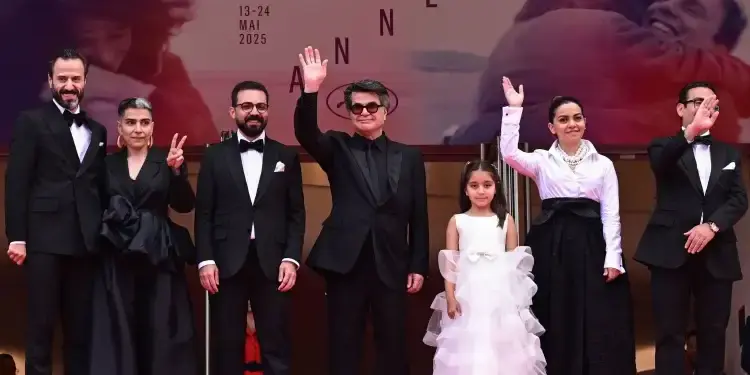Its author, Jafar Panahi, is not a stranger on the Cannes stage. Major director of Iranian cinema, he won the Golden Camera there in 1995 for The white balloon (Directors’ fifteen), the jury award for a certain look for Blood and gold In 2003, and his film Three faces The scenario prize has won there in 2018. But for more than ten years, its name is also synonymous with resistance. Resistance to a diet that tried to silence him, by prohibiting him from filming, traveling, or speaking publicly. This has never prevented him from continuing to do cinema, often in secret, often with makeshift means, but always with this vital need to question his time, his society, and the sufferings of his people.
A simple accidentas many of his previous films, was made without a shooting authorization issued by the Islamic Republic and the actresses of the film do not all carry the Hidjab, a transgression liable to heavy sorrows in Iran.
Jafar Panahi has paid dearly for his rebellion: arrests, house arrest, work ban, and several prison terms. He recently emerged from an incarceration of seven months, but during the Cannes presentation, he wanted to recall that many of his colleagues and sisters, in particular actresses, are always imprisoned or silenced, only for defending freedom, justice, or simply the truth.
On stage, the filmmaker dedicated the screening of his film to Iranian filmmakers, and more particularly to actresses ” who can no longer work because they participated in the women’s liberation movement and against the compulsory port of the veil ». Visibly moved, he spoke of his own detention, the impossibility of working freely in Iran, and the pain of seeing his comrades dispersed in the world, often in exile, torn from their land, but still continuing to make films. He concluded with this tenacious hope: ” One day, we can go home and film again in our country. »»
In A simple accidenteverything starts from an ordinary, almost harmless fact. A father, daughter, and a pregnant mother are by car at night. Suddenly, they hit and hurt a dog. The little girl criticizes her father for not slowing down. He defends himself, says that the animal threw itself under the car and that the road was not lit. A scene of ordinary appearance, but which already contains all the elements that will tip the film in an intense psychological drama.
The car broke down soon after. Is it because of the shock? We will never really know it. A man tries to help them, another observes them and begins to follow the family, discreetly. The next day, this man removes the father. He is about to kill him, but hesitates. Is he sure of his identity? Is it him, this former jailer, this man who tortured him in prison? The question haunts him. He decides to keep it captive while you can check. He then called on other former prisoners, also victims of the same executioner, to try to recognize him.
Everyone brings their testimony. There is the one who wants to forget, turn the page, start his life again, the one who claims immediate revenge, the one who fails to overcome the physical and psychological after -effects of torture … The film advances by successive layers, each voice bringing a nuance, a different pain. Until a final face-to-face between the prisoner and his kidnapper. Will the truth break out? Or is it just another projection of the broken memory of these men and women crushed by the repressive apparatus of a state that denies the most fundamental freedoms?
A simple accident is not a suspense film in the classic sense of the term, even if it borrows certain springs. It is above all a reflection on memory, justice, revenge, and the possibility (or the impossibility) of reconciliation. Jafar Panahi weaves a lucid metaphor for Iranian society, traumatized by decades of repression. Through the figures of his characters – the innocent child, the embarrassed father, the silent mother, the former prisoners torn between forgetting and revenge -, he deploys a fabric of individual stories which, put end to end, form a collective fresco of Iranian pain.
The staging, sober and tense, accentuates this feeling of suffocation. The tight plans, the games of shadow and light, the silences, the cries, everything contributes to creating an atmosphere of permanent doubt. Is it him? Is it the right one? Can we believe his memory? Can we do justice with so few certainties? Do we have the right to do justice? What if we kill, do we not become like this executioner? This is not the answer that matters, but the path that everyone takes. And over the film, the various characters evolve.
The film also questions what it means to be a human being in front of the state machine. He opposes, in an almost documentary way, the survivors and the executioners, the victims and the accomplices, the resistance fighters and the zealors. There is no manicheism in A simple accidentbut dizzying moral complexity. Everyone faces their choices, their pain, their past. Everyone tries to understand what has happened to him, and what they have to do now.
With this film, Jafar Panahi confirms that he is one of the great filmmakers in the present. Despite the prohibitions, arrests, forced exiles, he continues to make the voice of those who prevent speaking. A simple accident is perhaps his most political, and paradoxically the most human work. He reminds us that behind slogans, laws and censorships, there are lives. Damaged, but standing lives. Men and women who, against and against everything, continue to believe in dignity.
In Cannes, this cry found an echo. The public of the great Lumière Theater, standing, applauded this return in grace for a long time. A palm of gold would be a brilliant recognition, but the film has already accomplished much more: it has touched consciences. With an overwhelming simplicity.
Neïla Driss










